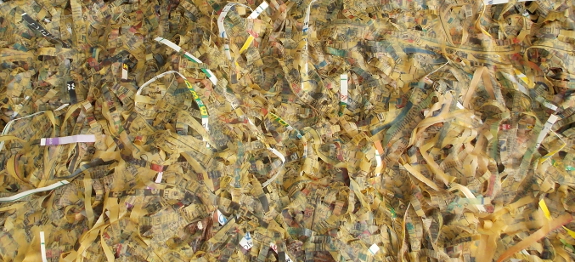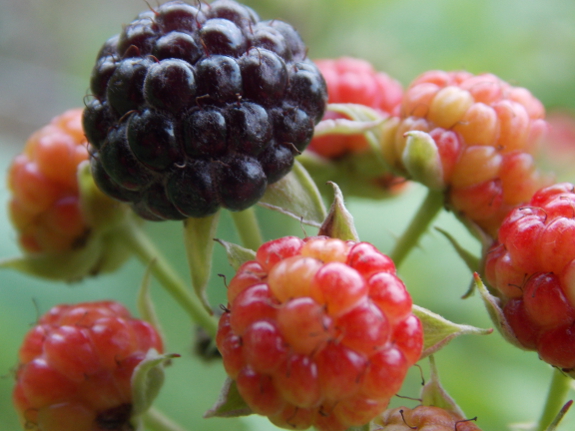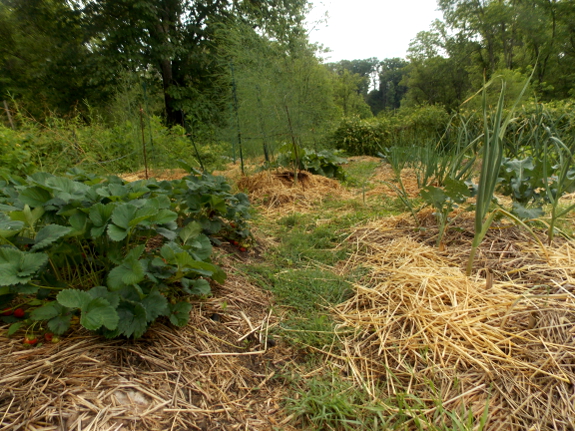
Is it safe to mulch with paper?

"I was actually wondering about this recently. I am somewhat leery of the chemicals in the paper and inks (even if it is soy based ink there are other chemicals in it that may not be great)." --- Sharon
I put this question to Tradd Cotter at his talk on mycoremediation
(using mushrooms to deal with chemical pollutants) and the upshot is
that fungi can break down nearly anything we throw at them as long as
the fungi are healthy. Since Mark and I work hard to create
fungus-friendly soils (by not tilling, never adding pesticides or
herbicides, always applying organic matter to the soil surface, and so
forth), I trust our fungi to break down everything except heavy metals.

The question becomes ---
will paper used as mulch in the garden contain heavy metals? A
study by West Virginia University showed that glossy paper may
contain heavy metals while, in contrast, paper with only black ink is
quite safe in the garden. The study didn't address the middle
ground, though --- non-glossy paper with color ink.
What do we do in our own
garden? Glossy paper hits the trash can (since it makes plants
grumble even before you consider the heavy metals issue),
black-and-white paper is used without concern in the garden, and
non-glossy paper
with colored ink goes in one place or the other, depending on how
desperate I am for mulch material. I figure that, given the
relatively low quantities of paper we use for mulch, simply using my
paper to mulch different areas each year will keep heavy metals from
building up to toxic levels. (My junk mail mulch probably amounts to about 1% of our annual mulch, if that.)

As a side, note, neither of the questioners addressed the C:N ratio
issue, but I think this is an important point for gardeners to
understand if they're using paper in or on their soil. Paper has a
C:N of between 50:1 and 175:1, which means that decomposing bacteria will suck
nitrogen out of your soil while breaking the paper down if you're not
careful. How do you get around this issue? Only use paper as
mulch in parts of your garden where you aren't going to till in the
near future, since mulch doesn't steal much nitrogen from the soil but
paper worked into your dirt definitely will. Or, if you must till
in paper mulches, be sure to apply some extra nitrogen (compost, manure,
urine, etc.) at the same time so the paper won't steal important
nutrients from your plants.
I hope that helps you
decide whether or not to use paper as mulch in your own garden. In
the end, it comes down to a personal decision about how careful you
want or need to be, and how much you want to save a buck and keep waste
materials out of the landfill. (Or to avoid a trip to the
recycling center if you have one nearby, which we don't.) We try
to use up as much of our "waste" as possible, so paper mulch, within
reason, is acceptable on our farm.
Want more in-depth information? Browse through our books.
Or explore more posts by date or by subject.
About us: Anna Hess and Mark Hamilton spent over a decade living self-sufficiently in the mountains of Virginia before moving north to start over from scratch in the foothills of Ohio. They've experimented with permaculture, no-till gardening, trailersteading, home-based microbusinesses and much more, writing about their adventures in both blogs and books.
Want to be notified when new comments are posted on this page? Click on the RSS button after you add a comment to subscribe to the comment feed, or simply check the box beside "email replies to me" while writing your comment.

The source states that paper with black ink is safe. I am concerned about paper with black toner, and that is quite different than ink. Do you have any thoughts on toner? Thanks!!
Newsprint contains a good deal of pine resin, which is bacteriocidal. That's why newspapers were often used as bedsheeting for home birthing in the old days. I don't know if they're also fungicidal or if the effect is big enough to affect its use as mulch.
In regards soil bacteria "sucking up N," is it really that important? It's not like they're eating their lunch and leaving the field, carrying the N away.
Chlorinated dioxins (the dangerous kind, simply said) can a by-product of bleaching paper with elemental chlorine (Cl2). As you can see here, in the US and Europe, paper production had almost totally shifted to processes that don't use elemental chlorine (and don't form chlorinated dioxins) by 2005.
So modern paper produced in the US would probably be OK in that regard.
It seems that chromium (often in combination with lead) is what you could expect to find in some inks. This probably comes from lead(II) chromate.
Not sure about the situation in the US, but in Europe lead chromate will be banned from 2015 by the REACH legislation. Some pigment manufacturers have phased it out already and others are in the process of doing so.
But it hard to be sure that a printing ink doesn't contain this stuff without testing. So I guess the prudent path would be to avoid colored inks until some years after the US and Europe have completely banned it and until China starts enforcing existing regulations on it.